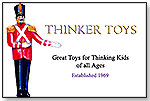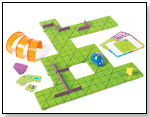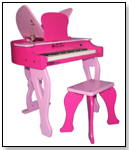|
|
Retail Solutions: How to Draw Customers to Your Store Hard Hats Turn Construction Blues Into Local News
This month, we start on the West Coast with three store-owners. Here is what they and Jon had to say: THINKER THINGS. DEL MAR, CALIF.  Challenges: “Our immediate area is an aging community and, with the price of gas, it's harder to get people to drive,” Owner John Naisbitt shared with TDmonthly. He estimated that most of his traffic comes from a prime area that radiates about 5 miles around the store. “I have some people who really like the store and come quite a distance, but that's getting more and more challenging,” he said. Challenges: “Our immediate area is an aging community and, with the price of gas, it's harder to get people to drive,” Owner John Naisbitt shared with TDmonthly. He estimated that most of his traffic comes from a prime area that radiates about 5 miles around the store. “I have some people who really like the store and come quite a distance, but that's getting more and more challenging,” he said.To boost sales, Naisbitt is having a new website built. His current site, though set up for selling, is “antiquated.” “We’re hoping to pick up some revenue there,” he said. “That'll be a challenge because none of us is technically savvy here!” Naisbitt is 52 and his mother/co-owner, Jane, is 72. “Our word of mouth has been tremendous,” Jane said. But they’re hoping to create even more buzz with a regular newsletter. Main goal: Keep customers coming and cash flowing, even as gas prices skyrocket. Jon’s Solutions: Most businesses draw the majority of their customers from a 5-mile radius. If you are not able to draw customers from beyond that, you have a business differentiation problem, which takes more than a simple solution to correct. Many toy stores around North America are still pulling customers from well beyond a 5-mile radius, but that is because they are more destination-focused, and consumers know that those businesses are the only place where they can get what they want. In this case, make sure you are using an email newsletter as part of your website redesign. This way, you can be enticing your regular customers to return more frequently. This assumes you have collected the email addresses of your customers, which, if you haven’t, should begin immediately. Do not assume that your new website will immediately generate revenue, but it has a better chance of doing so if you combine the launch of your newly-rebuilt website with some advertising, announcing it. This way, people have a better chance of going to it when they have a purchasing need. CHILD'S PLAY and GREEN FROG TOYS. PORTLAND, ORE.  Challenges: “[Child’s Play] has moved into a new place after 20 years in the old place,” Co-owner Patricia Fiedler explained to TDmonthly. Patricia and her husband, Dale, first opened the store 29 years ago on the same block. Challenges: “[Child’s Play] has moved into a new place after 20 years in the old place,” Co-owner Patricia Fiedler explained to TDmonthly. Patricia and her husband, Dale, first opened the store 29 years ago on the same block.Though the store has relocated just one door down, the building is undergoing renovation and the management hasn’t yet given Fiedler a definitive timeline. Outdoor construction should continue at least through the summer. “There will be lots of banging and construction workers parked in our parking lot during this time,” said Fiedler. “We're talking about what can we do to make this a big event … but we can't have a big party with the roof off!” Her new store, Green Frog Toys, is a block off the main strip in the Pearl District — a trendy, high-end neighborhood where pricey townhouses and condos have suddenly stopped selling. “We’re trying to build a coalition of children's stores called Kids in the Pearl. It’s easy now to motivate other storeowners, but I want to keep them motivated,” she said. “Customers love the idea that we've banded together for events and are creating loyalty to create a family-friendly neighborhood.” Main goal: Maintain past sales levels and customers for Child’s Play, while building a new clientele for Green Frog Toys. Jon’s Solutions: With any construction come headaches. Make sure you are capitalizing on the publicity opportunity for Child’s Play that you have with this construction. Let your local media know that you are tolerating it now, but that you look forward to the big changes that are happening. Everyone in your store should be wearing hard hats to bring attention to the changes that are coming! Pass out plastic hard hats to your customers! Take photos of the building being constructed and start a countdown to the day you are in the building. All of this self-promotion comes under the heading of Guerilla Marketing, marketing that entails creativity, your time, and sometimes, making yourself the focus of attention. Then, when you are in the building, it will be a bigger event than you imagined. At Green Frog Toys, you want to create a group of children’s stores. Start talking to other owners who might relocate their stores to your area. Start meeting regularly and begin sharing mailing lists, and creating some cooperative marketing where everyone splits the cost. Don’t design your new marketing materials yourself; bring in an outside marketing expert to create the message, and then, get every business in the area to promote it. That’s exactly the way a marketplace develops! AMBASSADOR TOYS. SAN FRANCISCO, CALIF.  Challenges: In contrast to most of the country, housing prices in San Francisco keep rising, which so far has kept business percolating for Owner Linda Kapnick. But being in a trendy, high-income city poses unique challenges, she told TDmonthly, particularly since last year’s toy scandals. Challenges: In contrast to most of the country, housing prices in San Francisco keep rising, which so far has kept business percolating for Owner Linda Kapnick. But being in a trendy, high-income city poses unique challenges, she told TDmonthly, particularly since last year’s toy scandals.“We’re in the heat of the battle in the PC capital of the world,” Kapnick said. ”We really have to be very aware of what's happening in the industry.” Customers demand safety and quality, though they’re sometimes misinformed about what that means. Also, while the economy seems to be stable in her city, “people are concerned about not spending too much,” she admitted. “We always try to bring various price points into our stores. If someone asks for a birthday present, we suggest something under $20 first, and then move up.” Main goal: Keep customers informed and satisfy their changing needs based on media reports and popular perceptions. Jon’s Solutions: Following are three marketing tools that an owner who wants to be an “expert” on their toy lines cannot be without these days — especially if they want to keep savvy customers coming back: A printed newsletter. Yes, newsletters were all the rage years ago, and I know they can be expensive to create, print, and mail, but print still has a longer “shelf life” than most advertising, and products that need description and explanation require a long-copy format, like a newsletter. An email newsletter: Some of the same information in your printed edition can be put in a Constant Contact (our favorite program) email newsletter, but you must make the information more focused and less wordy, with a specific “call to action” (what you want the customer to do after reading your words). Finally, a blog is cheap (many are free), easy to understand, and immediately positions you as an expert with consumers. Especially in a high-tech area like SF, blogs can bond a customer to a business as you write about your passion for toys, and those toys that are best for kids.  Writer's Bio: Jon Schallert is an internationally recognized speaker and small business expert who teaches businesses and communities how to turn themselves into Consumer Destinations. Schallert speaks to thousands annually on his proprietary 14-step "Destination Business" process that he developed over the course of 21 years of working with small business owners. His insight is frequently seen in national publications such as The Wall Street Journal and Entrepreneur Magazine. He is the only consultant in the world to have received the "Top Motivator" Marketing Award from Potentials Magazine. Read more articles by this author Writer's Bio: Jon Schallert is an internationally recognized speaker and small business expert who teaches businesses and communities how to turn themselves into Consumer Destinations. Schallert speaks to thousands annually on his proprietary 14-step "Destination Business" process that he developed over the course of 21 years of working with small business owners. His insight is frequently seen in national publications such as The Wall Street Journal and Entrepreneur Magazine. He is the only consultant in the world to have received the "Top Motivator" Marketing Award from Potentials Magazine. Read more articles by this author |
| |||||||||||||||||||||||||||||||||
Disclaimer Privacy Policy Career Opportunities
Use of this site constitutes acceptance of our Terms of Use.
© Copyright 2025 PlayZak®, a division of ToyDirectory.com®, Inc.



